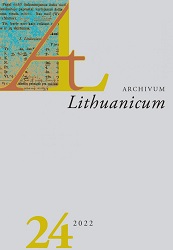Rytų, vidurio ir Mažosios Lietuvos raštijos sandūros 1863, 1865 m. reformatų religinės didaktikos knygelėse
The Confluence of the Writing of Eastern, Central Lithuania, and Lithuania Minor in Reformer Books on Religious Didactions from 1863 to 1865
Author(s): Birutė KabašinskaitėSubject(s): Historical Linguistics, Comparative Linguistics, Baltic Languages, 19th Century, Biblical studies
Published by: Lietuvių Kalbos Institutas
Keywords: Lithuanian language; 19th century; books on religious didactics; Biblical quotes;
Summary/Abstract: The article looks into five books on religious didactics published by the Calvinists in Eisleben in 1863–1865: Atsiminimas da geroje adijnoje, Nusidawimas biedna Joniuka, Prisiwertimas grieszna żmogaus ing Diewą, Wartojmas arba meginimas patis sawę and Gromata Naszłaitela ing sawa mieła Iszganitoja, which bibliographers and historians claim to have been written by Alexander Raphael Moczulski. A textological analysis has revealed Prisiwertimas not to have been drafted by Moczulski. This is evidenced in the differences in the spelling and the language of the texts covered by the analysis, the mismatched hypernormalisms, and the specific characteristics of the edits made to Biblical quotes and hymns. Certain qualities of the language in Prisiwertimas demonstrate that, unlike Moczulski, the editor of this text was under the influence of both the subdialect of Biržai and the subdialects of the northern Panevėžys region further to the west. Furthermore, Prisiwertimas features a much larger number of unique morphological forms not recorded elsewhere, which indirectly reflect the typical truncation of the ending of the Panevėžys subdialect and the resultant uncertainty on the editor’s part with regard to how certain parts of the text were to be written. The spelling and the language of the rest of the tracts covered by the analysis have a lot in common: without a shadow of doubt, they were drafted by the same person, as likely as not Moczulski. The hypercorrections that are present in the books edited by Moczulski suggest that, just like many Calvinists of the period, he was inclined to support the norms of the traditional Kėdainiai variant, even though by then the hub of Reformer activity had relocated to Biržai. Most efforts were focused on dropping the nasal reflexes of the East Aukštaitians. It is probable that all five publications covered by the analysis are not original tracts, but rather translations from German or Polish, even though no specific sources have yet been discovered (some references could be evident in the illustrations to the texts, particularly those that have a caption in Polish or German). The ample Biblical quotations in the books have been found to have been adopted from Bt¹ (or Bt²) and from the Lithuania Minor translation of the OT of the Bible that had been in circulation since 1735 (at least some of the tracts in question relied on the original 1735 edition). The research has allowed for the sources of the hymns featured in the books to be updated. The hymns were not original: one of them was a new translation of Friedrich von Lehr’s Spruch von der Bibel, others were adaptations of earlier Lithuanian tracts, such as the 1845 Calvinist hymnal, and several Lithuania Minor publications (in particular the official Lutheran hymnal). One hymn featured in Prisiwertimas has a very unique source: a rhymed text of a prayer from a translation of Rojaus Darželis (The Garden of Eden), a pietistic prayer book by Johann Arndt (its 1845 edition, in all likelihood), which had been supplied by Lithuania Minor worshippers at home. The rather intense use of Lithuania Minor Lutheran hymns in tracts by Lithuanian Reformers was yet another sign of vigorous collaboration between the two Protestant branches. The need for this collaboration was admitted by the Calvinist synod of 1862. It was critical for the continued existence of the Lithuanian Reformer Church.
Journal: Archivum Lithuanicum
- Issue Year: 2022
- Issue No: 24
- Page Range: 103-130
- Page Count: 28
- Language: Lithuanian

